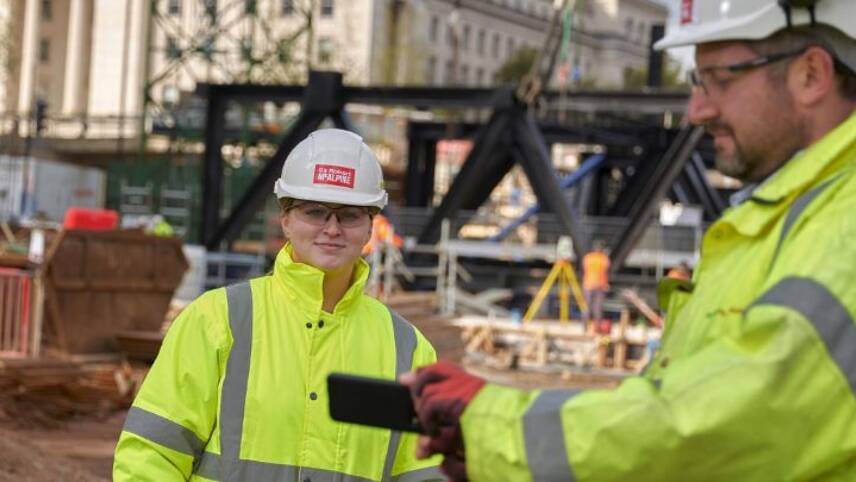Register for free and continue reading
Join our growing army of changemakers and get unlimited access to our premium content

Image: Sir Robert McAlpine
Landsec announced in 2019 that it intends to become a net-zero business by 2030. It then outlined plans to cut Scope 1 (direct), Scope 2 (power-related) and indirect (Scope 3) emissions from downstream leased assets by 70% by 2030 against a 2014 baseline, and had these targets verified in line with 1.5C by the Science-Based Targets Initiative (SBTi).
The firm has this week launched a new transition plan to deliver these emissions reductions, backed with £135m of new funding. This is equivalent to around 1% of the Landsec portfolio value.
Funding will be spent on reducing operational energy use using a mix of technology (artificial intelligence and building energy management systems) and behaviour change engagement with customers; installing low-carbon heating systems including heat pumps and scaling up onsite renewable electricity generation.
To this latter point, Landsec currently has 1.4MW of onsite renewable energy generation capacity installed and is aiming to bring its portfolio to 3MW by the end of the decade. It already sources 100% of contracted electricity using certificate-backed sources, but has stated that it now wishes to promote additionality through a mix of self-generation and power purchase agreements (PPAs).
On energy efficiency, Landsec’s 2030 target is to reduce the energy intensity of buildings by 40% against a 2013-14 baseline. This applies to all properties under the firm’s management for two or more years. This reduction was technically achieved in 2020 but the firm has stated that Covid-19 restrictions mean this period “doesn’t reflect portfolio energy performance in normal conditions”.
Landsec’s chief executive Mark Allan said: “We’re investing across our entire estate because we want to remain at the forefront of everything the property sector is doing to respond to the climate crisis. Through these actions, we’ll be supporting the current and future needs of our customers, communities and stakeholders as we help them transition to a low carbon world.
“Never has it been more important to prioritise carbon reduction programmes. The future of the planet depends on businesses like ours driving forward change – as quickly as we can.”
Sir Robert McAlpine
In other sustainability news from the UK’s built environment sector, Sir Robert McAlpine has committed to developing 1.5C-aligned science-based targets within the next 18 months.
The firm has also announced a string of measures to help it deliver on an existing ambition to reach net-zero operational (Scope 1 and 2) emissions by 2024. It will stop purchasing diesel for generators and other technologies on building sites from April 2022, switching instead to hydrotreated vegetable oil (HVO). HVO is a drop-in replacement for diesel and reduces air pollution at the generator site as well as reducing carbon across the life-cycle. Additionally, battery-assisted generators will be added to the mix.
Additionally, Sir Robert McAlpine has launched a new Ultra Low Emission Vehicle (ULEV) car scheme for employees, incentivising the shift to electric vehicles (EVs).
While the firm’s science-based targets are still in development, for them to be 1.5C-aligned, they will need to include ambitious aims for reducing Scope 3 emissions. The firm has, therefore, begun rolling out a whole life carbon calculator for clients.
“They say that actions speak louder than words – now is the time to live by that,” said Sir Robert McAlpine’s head of sustainability Simon Richards. “Whilst 2050 seems like a long way away, the magnitude of change that we have to enact means that it will be here fast. When it comes to climate resilience, I am proud of what we are doing, putting in place things today that will deliver meaningful change and do our bit to secure our future.”
The news comes less than a week after COP26 concluded in Glasgow. You can catch up with edie’s round-up of the biggest headlines from Cities, Regions and Built Environment Day here, and stream the episode of the COP26 Covered Podcast recorded on that day here. The podcast features exclusive interviews with the UK Green Building Council, Holcim and Jacobs.
Sarah George


It’s great that companies like these are taking climate change seriously, but they and others do know, I hope, that "1.5C-aligned targets" means truly-zero emissions, by everyone, by 2030? Warming is racing ahead of IPCC’s estimates , now +1.27C -v- IPCC trend estimate of +1.1C – http://berkeleyearth.org/global-temperature-report-for-2020/.